[ad_1]
Rabbits are herbivores, but contrary to popular belief, they don’t just eat grass.
Rabbits actually eat a hugely varied diet consisting of all sorts of plant matter, specifically lots and lots of hay but also a great variety of vegetables, fruits and supplementary pellets.
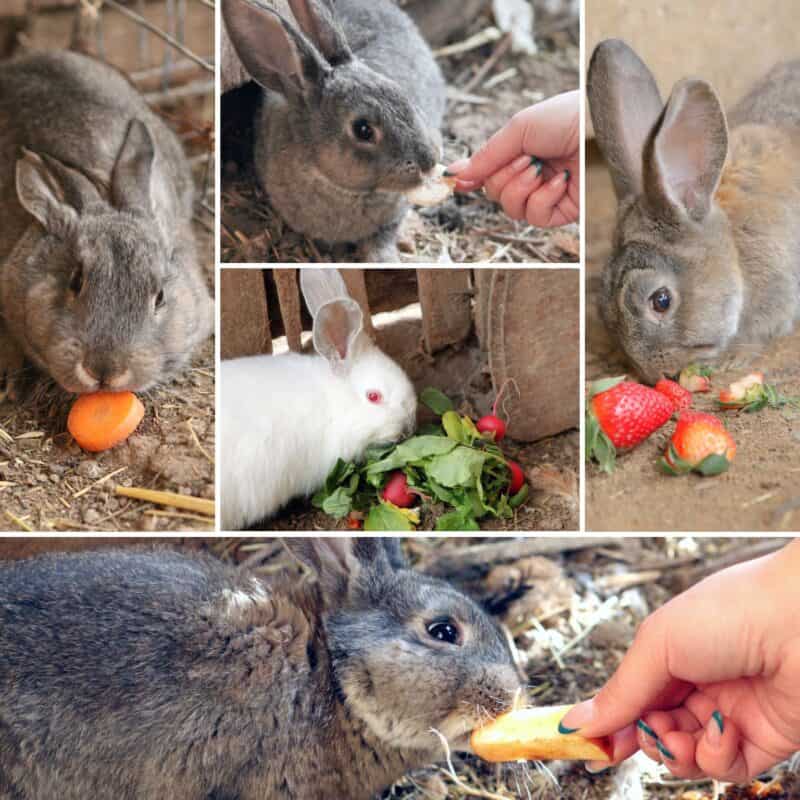
But not all things are good for your rabbits, even if thay seem healthy and wholesome, so you’ll need to know for sure what you can feed them if you want them to stay healthy and thrive.
Below you’ll find a list of the healthiest foods for your rabbits.
Hay
Hay is a staple food for rabbits, and as grazing animals, they generally eat hay all the time, more or less. For most of their calorie intake, hay is indeed what they should be eating.
Most kinds of hay are fine for rabbits, but there are three that are ideal for them.
Some hay, like alfalfa, is it full of protein and minerals that rabbits can make use of, but they generally only need it on a very limited basis because it is easy for them to overeat and get sick from it.
The following types of hay are all acceptable choices for rabbits, though alfalfa should only be fed to them on a limited basis.
1. Timothy Hay
Timothy hay is one of the most popular choices for rabbits. High in fiber and relatively low in protein, it’s ideal for most adult rabbits’ digestive health when supplemented with other foods.
This type of hay also helps to grind down the rabbit’s teeth (a necessity!) and hopefully prevent dental issues.
However, the downside is that it can sometimes be hard to find fresh, high-quality timothy hay, and it might be a bit more expensive compared to other types.
2. Brome Hay
Brome hay is another excellent pick for your rabbits. Soft and leafy, it’s highly palatable even for your pickier eaters.
The nutritional profile is similar to that of timothy hay, and likewise it promotes good digestive and dental health.
The only potential shortcoming is its availability: not all pet stores carry brome hay, so you may need to order it online or find a specialty retailer in your area.
3. Orchard Hay
Orchard hay is another soft variety of hay, and one that many rabbits enjoy. It’s a great alternative to Timothy hay if you cannot track down a quality source.
Nutritionally, it provides the high fiber content rabbits need, but it’s less effective at naturally wearing down a rabbit’s teeth due to its softer texture.
4. Alfalfa Hay
Alfalfa hay is rich in both protein and calcium, and that makes it an excellent choice for growing rabbits or older rabbits that might need more protein.
However, it’s because of this high protein and calcium content that it isn’t suitable as a mainstay feed: regular intake will cause obesity and urinary stone, among other problems.
It’s best used as a treat or supplement for adult rabbits rather than their primary source of hay.
Vegetables
Rabbits love vegetables, and they are packed with nutrients that they need.
But, many vegetables are also high in moisture and calories that can upset a rabbit’s digestive tract if they eat them to excess.
To avoid this, you generally want to give rabbits limited quantities of vegetables though they can have them every day.
Also, you’ll want to vary the kinds of vegetables that they get, but make it a point to introduce them to your animals slowly, one at a time, and observe any diarrhea or digestive upset.
5. Radicchio
Radicchio can be a beneficial addition to a rabbit’s diet. Rich in fiber and low in sugar, good for digestive health, this brightly-colored cabbage-like veggie also has vitamins A, C, and K, and anthocyanins that may help reduce cellular damage in rabbits.
However, excessive consumption should be avoided as it can lead to digestive issues.
A little will do, and if you want to give your rabbits more leafy stuff stick to the dark green “salad veggies” instead.
6. Bell Peppers
Bell peppers are totally safe and tasty for your rabbits and provide a good source of vitamin C, an essential nutrient for them.
They are low in calories but high in water content, aiding hydration for your rabbits.
However, they should be given in moderation because too much moisture will loosen your bunny’s stools. Also, bell peppers only: never feed rabbits spicy peppers!
7. Watercress
Watercress is a nutrient-dense, peppery leafy green that’s nonetheless safe for rabbits to eat. It’s packed with vitamins and minerals, including vitamin K, which supports blood clotting.
But once again, due to its high calcium content it should be fed on a limited basis to your bunnies, especially those already prone to urinary calculi- bladder stones.
8. Broccoli
Broccoli is among the healthiest veggie options for rabbits, providing many vitamins and plenty of fiber.
However, the florets have compounds that can cause serious gas if eaten in large quantities, potentially leading to gastrointestinal discomfort or injury.
Therefore, only small amounts of florets should be offered: the stems and leaves can be given more liberally. If your bunny seems uncomfortable after eating florets, back them off.
9. Mint
Mint can be a refreshing and surprisingly nutritious option for rabbits. It aids digestion and can even help to calm indigestion.
Though safe, mint should be fed sparingly due to its intense flavor which can turn off some rabbits.
If they don’t like it, that’s okay; there’s plenty more on this list that they will!
10. Carrot Greens
Carrot greens are actually more nutritious for rabbits than the carrot itself. They’re packed with vitamins, fiber, and potassium and rabbits really love them.
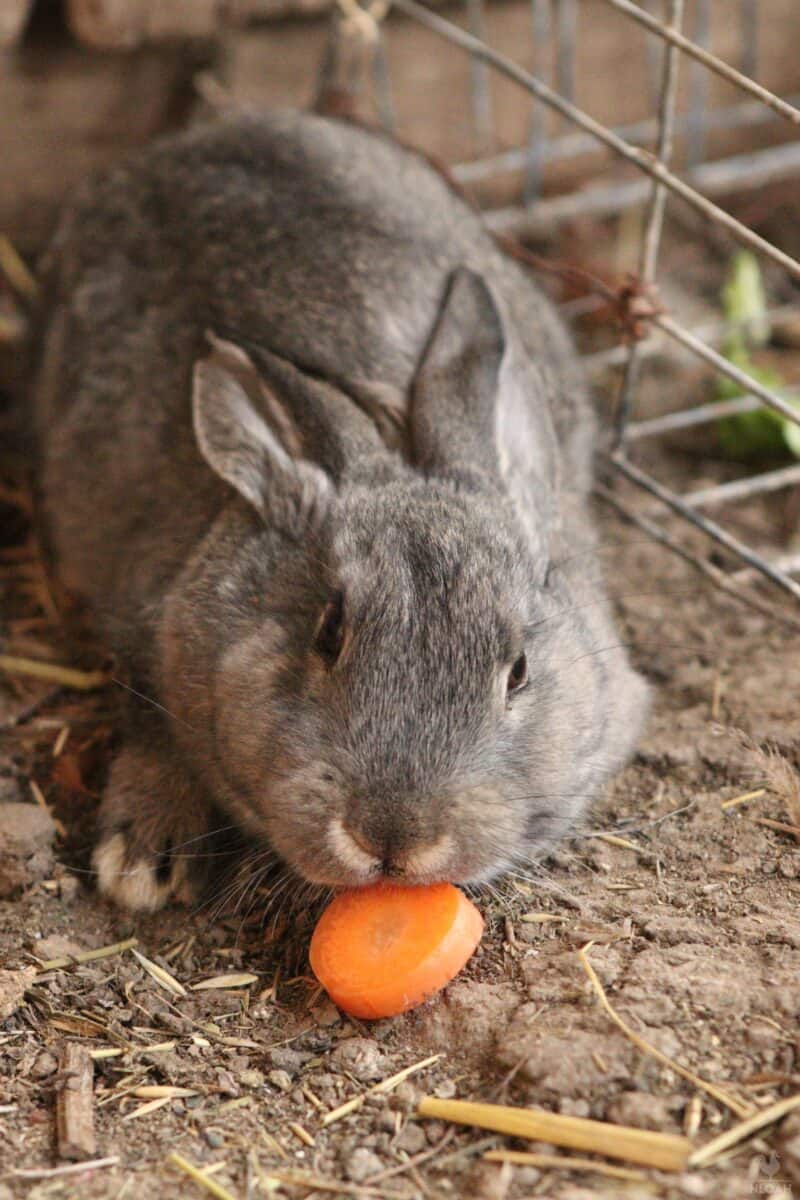
11. Carrots
You just knew this was going to be on here. Everyone knows rabbits love carrots. But while rabbits do like them, carrots should be given quite sparingly due to their high sugar content.
Too many can cause obesity and that will lead to other health issues.
12. Dandelions
Dandelions aren’t just an annoying weed: both greens and flowers are excellent for rabbits! All parts are rich in vitamins A, C, and K, as well as calcium and potassium.
Like many wildflowers they also have a high fiber content, promoting good digestive health.
There are no significant drawbacks, but as with all foods for your precious bunnies, they should be introduced slowly and fed in moderation alongside hay.
13. Beet Tops
Beet tops are another nutritious choice for rabbits, packed with minerals needed for good bones and circulatory health.
However, due to their higher calcium content, they should be given cautiously to prevent urinary tract problems as mentioned above.
14. Sprouts
Sprouts are great sources of fiber and protein for rabbits. Depending on the type, they offer a variety of benefits to a rabbit’s diet.
Alfalfa, clover, radish, and more are all okay for rabbits as a part of a complete diet.
15. Peppermint (Herb Only, Not Candy!)
The peppermint herb is another nutrient-packed and refreshing treat for rabbits that like it. Like other herbs, it should be fed sparingly as part of a well-rounded diet.
And like other kinds of mint, this is a take it or leave it item for rabbits: some can’t get enough, others seem repulsed by it.
16. Basil
Basil is an herb that rabbits can safely enjoy all the time. It contains essential nutrients and lots of vitamins A and K.
17. Spinach
Spinach is one of the healthiest leafy greens around: rich in many vital nutrients, it has a drawback for rabbits in that it is high in oxalates.
These compounds may cause kidney problems if consumed excessively, so you’ll want to pay attention to your rabbits’ net consumption of brassica plants. Best served in moderation with other greens your rabbits like.
18. Cilantro
Another super-nutritious herb. Cilantro is a hands-down favorite among many rabbits. It’s packed with all kinds of vitamins and minerals, and is always a good boost to their diet.
19. Collard Greens
Collard greens are high in fiber and many other nutrients, making them a good addition to a rabbit’s diet.
However, they’re also a brassica genus plant like spinach, and that means high oxalate content.
Nothing to worry over, just don’t feed it to your bunnies all the time and mind their net intake.
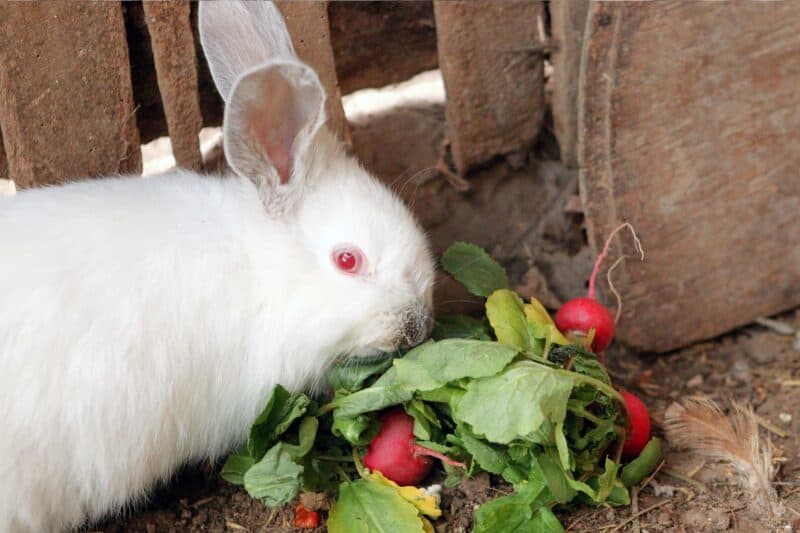
20. Radish Tops
Radish tops are safe for rabbits, offering a good source of vitamins. Feed in moderation: slightly spicy, may affect your bunnies’ tummies!
Digestive upset is not out of the question, so easy does it on the quantity. Some will like it, some won’t.
21. Bok Choy
Balk choy is another safe and nutritious leafy vegetable for rabbits, highly rich in vitamins A and C. A great compliment or alternative to other green veggies, it is another brassica plant. Mind the quantity!
22. Escarole
Escarole is packed with nutrients and can be a healthy part of a rabbit’s diet. However, its bitter flavor may not be appreciated by all rabbits. If they like it, great, if not, delete it from their menu.
23. Raspberry Leaves
Raspberry leaves are loved by most rabbits and totally safe. They also have known beneficial compounds which can help stabilize digestion.
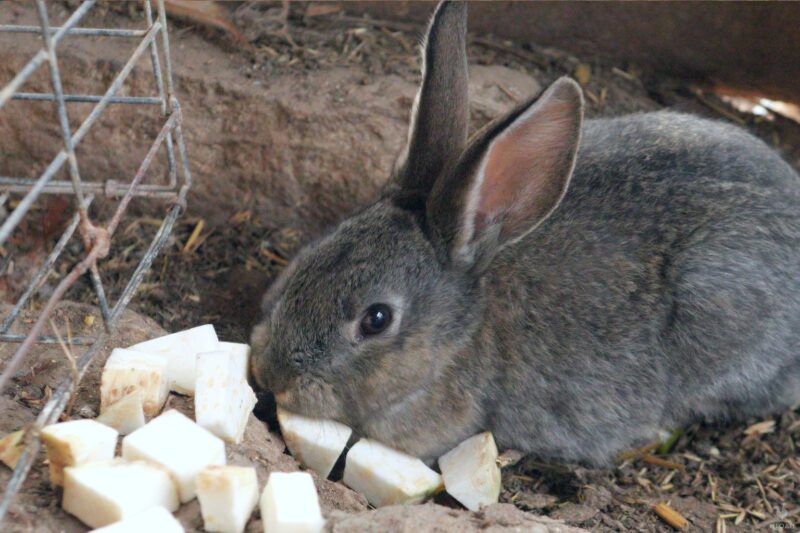
24. Celery
Celery is a crunchy treat that most rabbits enjoy, and it’s not the nutritionally bankrupt veggie that haters say it is.
It’s very hydrating and packed with nutrients, but the water content means it must be fed on a limited basis to prevent diarrhea.
Also, pay attention when giving it to your rabbits; it isn’t out of the question that the strings might be a choking hazard for some bunnies.
25. Wheat Grass
Wheat grass is a great source of fiber for rabbits and can aid digestion. Most rabbits seem to love the stuff – a lot more than people do, anyway!
26. Brussels Sprouts
Tiny and super nutritious cabbages, Brussels sprouts can be given to rabbits in small amounts owing to the high oxalate content.
They can also cause gas and bloating if overfed, leading to discomfort and pain for your rabbit pal. A little goes a long way!
27. Endive
Endive is yet another good leafy green that’s safe for rabbits. It’s a great source of vitamins and fiber.
28. Parsley
Much more than garnish, parsley is supremely nutritious, crammed with all kinds of nutrients rabbits need. It’s also high in calcium, so keep an eye out for any signs of bladder or urinary issues.
29. Mustard Greens
Mustard greens can be a novel and tasty treat for rabbits, providing a good source of various vitamins. However, due to their pungent, spicy flavor, these may or may not be loved by your rabbits.
30. Pea Pods
Pea pods can be a crunchy and interesting addition to a rabbit’s diet. They’re low in calories and contain many useful nutrients.
However, they should be offered in moderation due to their sugar content; they have significantly more than most veggies!
Remember that rabbits prefer sweet foods much of the time, so don’t let them overdo it.
31. Clover
Clover is a safe and nutritious food for rabbits, providing a good amount of fiber. However, its high protein content means it must be limited in a rabbit’s diet.
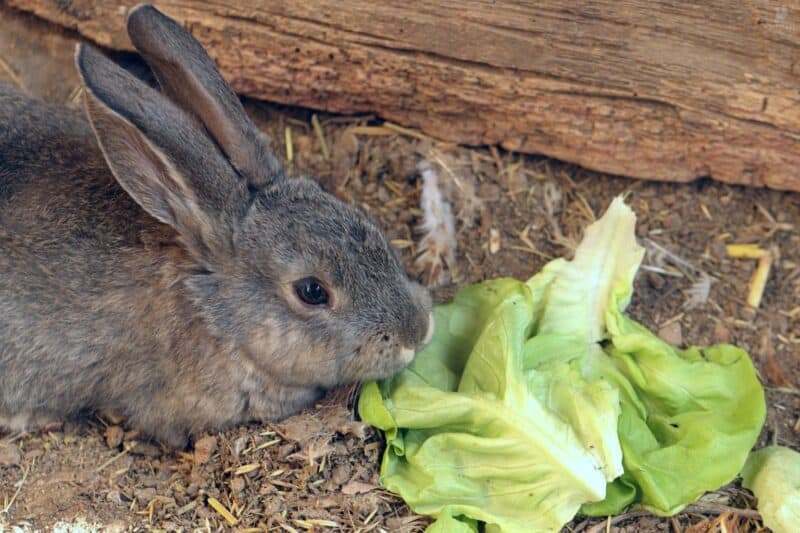
32. Romaine Lettuce
Romaine lettuce is a safe option for rabbits, offering good vitamin content and fiber.
33. Kale
Kale is a nutrient-dense food for bunnies, and loaded with vitamins. However, due to its high calcium and oxalate content it must be given sparingly; it is another brassica plant.
Safe, yes, but you can over-feed it to rabbits!
Fruits
Rabbits also love to eat a wide variety of fruit. Fruit is definitely good for rabbits, but in very limited quantities.
It’s because fruit contains a lot of sugar and most rabbits have a serious sweet tooth meaning they will easily take to fruit and ignore the rest of their food.
That will quickly lead to significant nutritional imbalances and also major digestive upset, so you don’t want that to happen!
Give your rabbits small quantities of fruit daily, but reserve the sweetest and most sugary fruits like bananas, grapes, and peaches as treats.
And just like vegetables, introduce fruit to your rabbits slowly and one kind at a time to prevent digestive troubles.
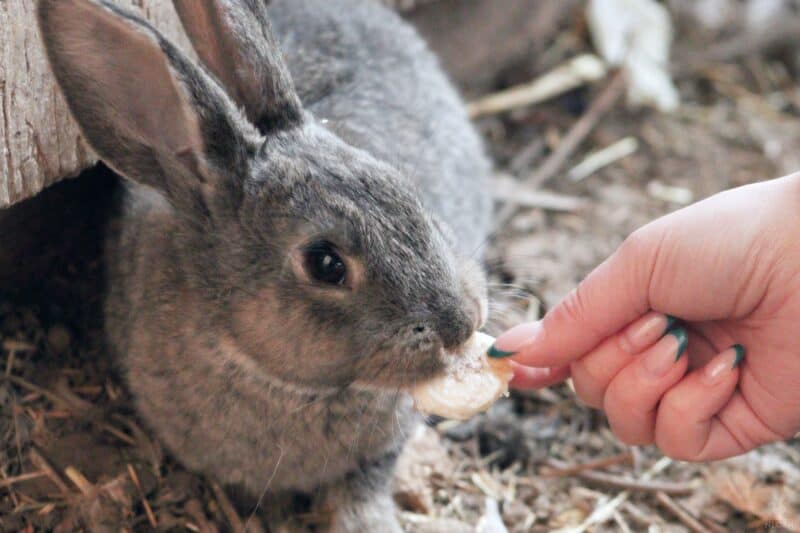
34. Bananas
Bananas can provide rabbits with plenty of potassium and many vitamins. However, as they’re very high in sugar only small amounts should be given occasionally.
35. Oranges
Oranges can provide rabbits with a great dose of vitamin C. However, they are acidic and have a lot of sugar, so they should only be given as an occasional treat. Rabbits can eat the peel, though, if they like it.
36. Blackberries
Blackberries offer rabbits a rich source of antioxidants, vitamins, and fiber that can help enhance their immune system. And they love them!
Like other fruits, they contain lots of sugar, so they should be fed sparingly.
37. Pears
Pears provide rabbits with essential nutrients like vitamins A and C. Offer occasionally and in small quantities.
38. Pineapple
Pineapple provides rabbits with tons of vitamin C and a natural enzyme called bromelain that aids digestion. Quite sugary, it should only be given as a rare treat and always without the skin or core.
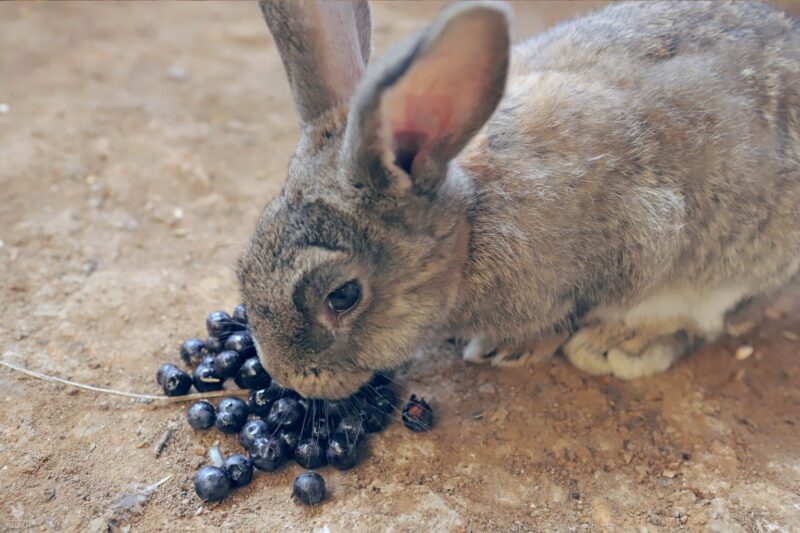
39. Blueberries
Blueberries are very rich in needed antioxidants and many vitamins, making them a healthy treat for rabbits. Treat: due to their sugar content, they should not be fed to rabbits except as treats.
40. Melons
Melons, such as cantaloupe or watermelon, are very hydrating and can provide great quantities of vitamins A and C.
Due to their high water and sugar content, they should be given sparingly to avoid digestive upset.
41. Raspberries
Like blackberries, raspberries are packed with antioxidants, vitamins, and fiber beneficial for rabbits. You know the drill: high sugar content means they should only be given as an occasional treat.
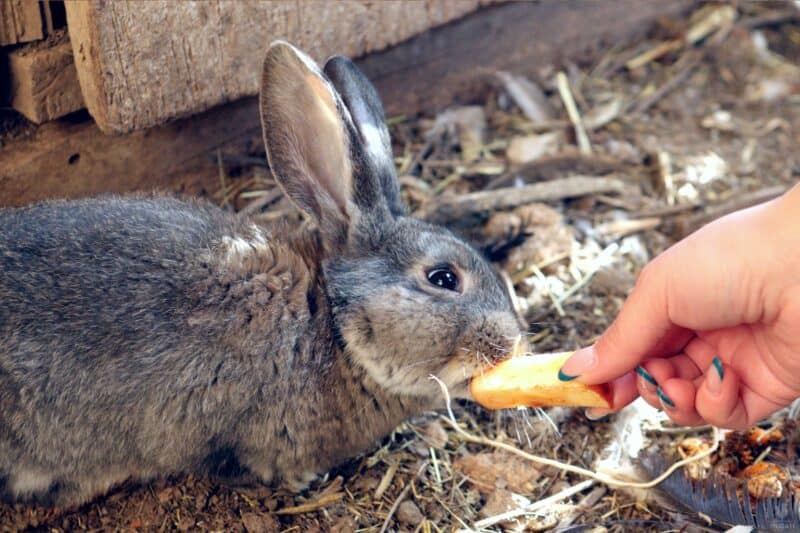
42. Apples
An apple a day keeps the vet away? Not exactly, but apples are safe for rabbits, providing fiber and various vitamins. But they are high in sugar, so they should fed as treats.
Always remove the seeds as they are toxic.
43. Peaches
Peaches can also provide rabbits with vitamins A and C. But despite their nutritional benefits, peaches are also super-high in sugar and should be fed as rare treats.
The pit should also always be removed as it can pose a choking hazard.
44. Plums
Juicy plums are a good source of vitamins and minerals for rabbits. However, they’re also high in sugar and can have a pronounced laxative effect, so keep an eye on your rabbits. Also, remove the pit if they aren’t already pitted.
45. Papaya
Papaya is a good source of vitamins A, C, and E for rabbits. It also contains fiber which aids digestion. Again, super-high sugar content, feed as treat and always without the seed.
46. Grapes
Grapes are safe for rabbits to consume, and contain antioxidants, vitamins, fiber, magnesium, potassium, and copper.
However, they’re very high in sugar and should be given as treats to prevent obesity and digestive issues. Remove the seeds.
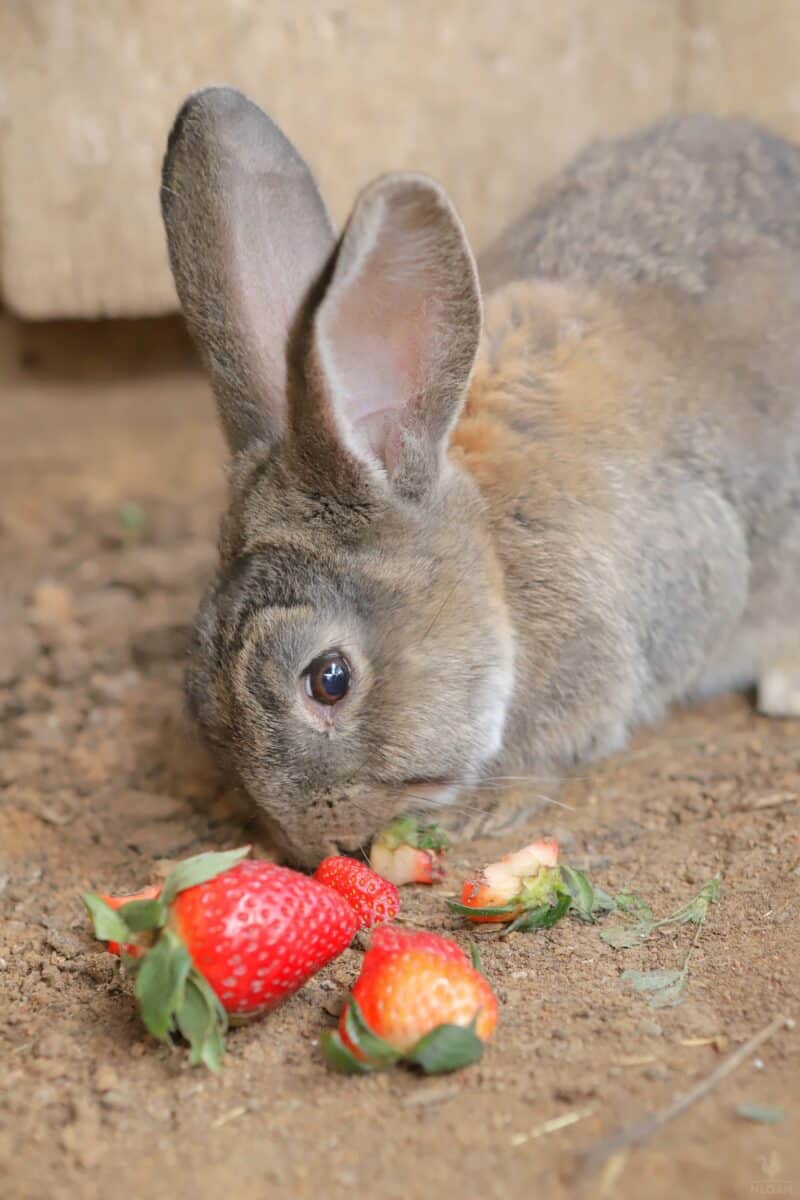
47. Strawberries
Strawberries provide rabbits with vitamins and antioxidants. But they are sugary, like all fruits, so don’t give them too many.
Other Foods
48. Pellets
Rabbit pellets are a good supplementary food item for bunnies, particularly young and old rabbits. However, it should not be the majority part of their diet: that is what they need hay for.
Keep in mind that these pellets do go stale and spoil, so you’ll only want to keep enough on hand for about a month at a time. Feeding your rabbits old pellets can easily make them sick.
Any quality pellet that is designed for a rabbit’s nutritional needs is fine, but do keep an eye on the fiber content. At the least, rabbit pellets should contain about 18% fiber, and a 20% or more is better.
49. Milk
Rabbits, like all mammals, subsist on milk for the first few weeks of their life. But as they grow older, they don’t need milk anymore and they switch to eating solid foods.
Accept your rabbits to subsist on milk entirely for the first 3 weeks or so of their life, and their milk consumption should be tapering off at the end of week 3 through about week 7.
During this time, baby bunnies should be eating more and more solid food, starting out with a few nibbles of early life pellets and other solid foods before transitioning completely to pellets and hay once they’re about 2 months old.
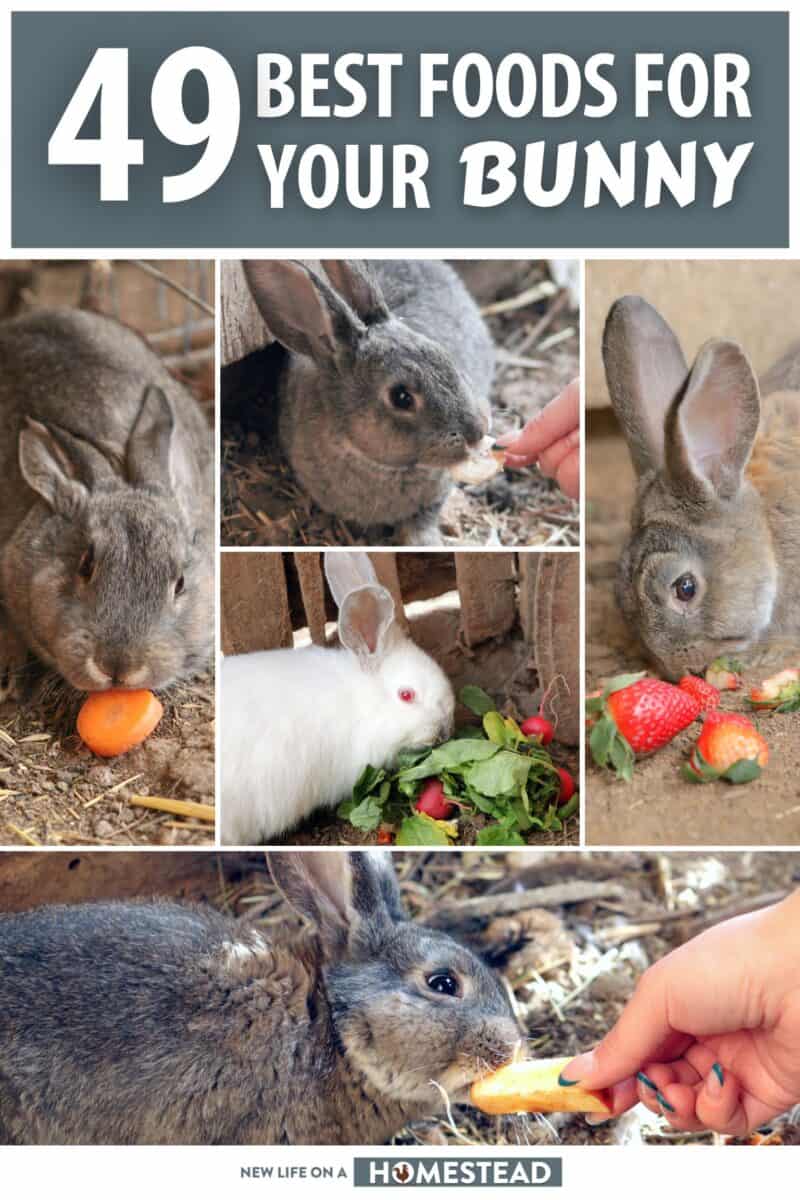
[ad_2]
Source link
Get more stuff like this
in your inbox
Don't Be Left Unprepared
Thank you for subscribing.
Something went wrong.




